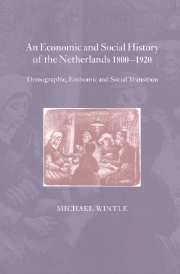 An Economic and Social History of the Netherlands, 1800–1920
An Economic and Social History of the Netherlands, 1800–1920 Book contents
- Frontmatter
- Contents
- List of plates
- List of figures
- List of tables
- Acknowledgements
- General introduction
- Part I Demography, and the health of the nation
- Part II Economic Transition
- 3 Economic performance and industrialization: the Dutch debate
- 4 Factor inputs: labour, capital, materials
- 5 Economic influences: entrepreneurship, technology, and government policy
- 6 Sectoral analysis
- 7 Features of demand
- 8 Economic transition: conclusion
- Part III Social transition: state, society, individual and nation
- General conclusion
- Bibliography
- Index
4 - Factor inputs: labour, capital, materials
Published online by Cambridge University Press: 13 August 2009
- Frontmatter
- Contents
- List of plates
- List of figures
- List of tables
- Acknowledgements
- General introduction
- Part I Demography, and the health of the nation
- Part II Economic Transition
- 3 Economic performance and industrialization: the Dutch debate
- 4 Factor inputs: labour, capital, materials
- 5 Economic influences: entrepreneurship, technology, and government policy
- 6 Sectoral analysis
- 7 Features of demand
- 8 Economic transition: conclusion
- Part III Social transition: state, society, individual and nation
- General conclusion
- Bibliography
- Index
Summary
Introduction
We now move to an analysis of the inputs to the Dutch economy, over the course of the next two chapters. The inputs to the economy are divided as follows. In chapter 4, we deal with the traditional tripartite separation between labour, capital and materials. In looking at labour we shall examine the changing size of the Dutch labour force, its skills, its cost, and regional variations in that cost. Under capital we shall concentrate on financial capital, and take as a point of departure the traditional argument that Dutch industry was starved of funds in the nineteenth century. It will then be possible to arrive at a conclusion on the role played by the factor capital, in all its aspects, in the economic development of the country. At the end of chapter 4, we shift attention to materials, a category which includes land, minerals, and particularly energy sources, as well as other raw materials.
Chapter 5 contains an account and analysis of a number of other influences on the supply side of the economy, to do with what early economists called the ‘organization’ of the prime factors dealt with in chapter 4. Some of these organizational influences are now sometimes referred to as ‘residuals’, and they have to do with the efficiency and organization of the economy. We have isolated three categories for the purposes of inventory and analysis: entrepreneurship, technology and government policy.
- Type
- Chapter
- Information
- An Economic and Social History of the Netherlands, 1800–1920Demographic, Economic and Social Transition, pp. 84 - 122Publisher: Cambridge University PressPrint publication year: 2000
